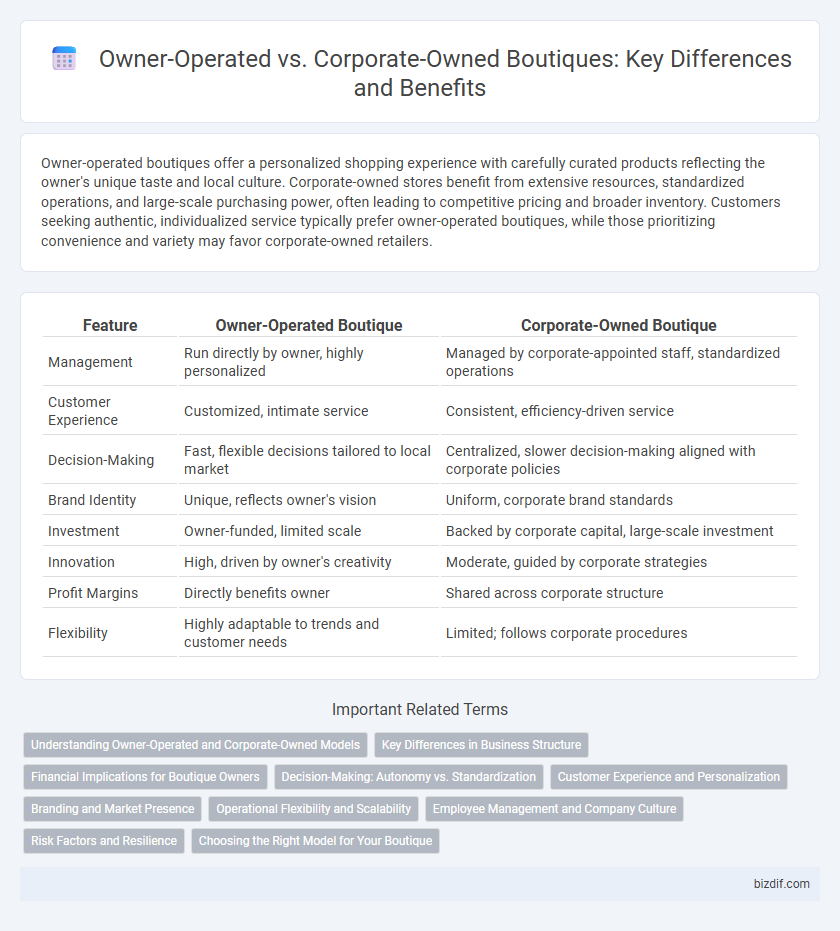Owner-operated boutiques offer a personalized shopping experience with carefully curated products reflecting the owner's unique taste and local culture. Corporate-owned stores benefit from extensive resources, standardized operations, and large-scale purchasing power, often leading to competitive pricing and broader inventory. Customers seeking authentic, individualized service typically prefer owner-operated boutiques, while those prioritizing convenience and variety may favor corporate-owned retailers.
Table of Comparison
| Feature | Owner-Operated Boutique | Corporate-Owned Boutique |
|---|---|---|
| Management | Run directly by owner, highly personalized | Managed by corporate-appointed staff, standardized operations |
| Customer Experience | Customized, intimate service | Consistent, efficiency-driven service |
| Decision-Making | Fast, flexible decisions tailored to local market | Centralized, slower decision-making aligned with corporate policies |
| Brand Identity | Unique, reflects owner's vision | Uniform, corporate brand standards |
| Investment | Owner-funded, limited scale | Backed by corporate capital, large-scale investment |
| Innovation | High, driven by owner's creativity | Moderate, guided by corporate strategies |
| Profit Margins | Directly benefits owner | Shared across corporate structure |
| Flexibility | Highly adaptable to trends and customer needs | Limited; follows corporate procedures |
Understanding Owner-Operated and Corporate-Owned Models
Owner-operated boutiques are independently managed by the founder, allowing for personalized customer service, unique product selections, and a strong local community connection. Corporate-owned boutiques function under larger brand umbrellas, benefiting from standardized operations, extensive marketing resources, and economies of scale that drive competitive pricing. Understanding these models helps in recognizing the trade-offs between customization and scalability in boutique retail.
Key Differences in Business Structure
Owner-operated boutiques feature a single individual or family managing daily operations, enabling personalized customer service and agile decision-making. Corporate-owned boutiques are part of larger organizations with standardized procedures, benefiting from economies of scale, brand consistency, and greater access to capital. The key difference lies in ownership control, where owner-operated stores emphasize personal involvement, while corporate-owned stores prioritize scalability and uniformity.
Financial Implications for Boutique Owners
Owner-operated boutiques often experience greater control over financial decisions, enabling personalized budget management and profit retention. Corporate-owned boutiques benefit from economies of scale and access to extensive capital, but profits are distributed among shareholders, reducing direct financial gains for local managers. The choice between ownership models impacts cash flow, investment strategies, and long-term financial sustainability for boutique entrepreneurs.
Decision-Making: Autonomy vs. Standardization
Owner-operated boutiques benefit from greater autonomy in decision-making, allowing for personalized customer experiences and unique product selections tailored to local market demands. Corporate-owned boutiques emphasize standardization, implementing uniform policies and branding to maintain consistency across multiple locations. This contrast affects responsiveness to trends, operational flexibility, and the degree of innovation within the boutique retail sector.
Customer Experience and Personalization
Owner-operated boutiques deliver a unique customer experience with personalized service tailored to individual preferences, creating strong emotional connections and brand loyalty. Corporate-owned boutiques often emphasize standardized processes and efficiency, which can limit customization but ensure consistent quality across locations. Personalized attention in owner-operated settings increases customer satisfaction and fosters repeat business through bespoke product recommendations and attentive care.
Branding and Market Presence
Owner-operated boutiques often cultivate a unique, authentic brand identity reflecting personal vision, which resonates deeply with niche markets and fosters strong customer loyalty. Corporate-owned boutiques leverage extensive resources and standardized branding strategies to achieve broad market presence and consistent customer experiences across multiple locations. The contrasting approaches influence market positioning, with owner-operated stores excelling in localized engagement and corporate-owned entities dominating through scale and brand uniformity.
Operational Flexibility and Scalability
Owner-operated boutiques benefit from high operational flexibility, allowing personalized customer experiences and agile decision-making tailored to niche markets. Corporate-owned boutiques leverage scalability through standardized processes, larger capital resources, and extensive supply chain networks, enabling rapid expansion and consistent branding across multiple locations. Balancing flexibility with scalability depends on strategic priorities, with owner-operators favoring customization and corporates emphasizing efficiency and uniform growth.
Employee Management and Company Culture
Owner-operated boutiques foster close-knit employee management and cultivate personalized company culture, promoting direct communication and tailored growth opportunities. In contrast, corporate-owned boutiques often implement standardized employee policies and hierarchical structures, ensuring consistent but less individualized workplace environments. Emphasizing employee empowerment and cultural authenticity, owner-operated boutiques typically experience higher staff engagement and loyalty.
Risk Factors and Resilience
Owner-operated boutiques exhibit higher resilience due to personalized management and agile decision-making, reducing risk factors related to market fluctuations and customer engagement. Corporate-owned boutiques face increased risk from standardized policies and slower response times, which can hinder adaptability in competitive retail environments. Tailored control in owner-operated boutiques often leads to stronger customer loyalty and quicker recovery during economic downturns.
Choosing the Right Model for Your Boutique
Choosing between owner-operated and corporate-owned models for your boutique hinges on your vision for control and brand identity. Owner-operated boutiques offer personalized customer experiences and agile decision-making, fostering unique brand authenticity. Corporate-owned boutiques benefit from established systems and scaling potential but may sacrifice individuality and flexibility.
Owner-Operated vs Corporate-Owned Infographic

 bizdif.com
bizdif.com